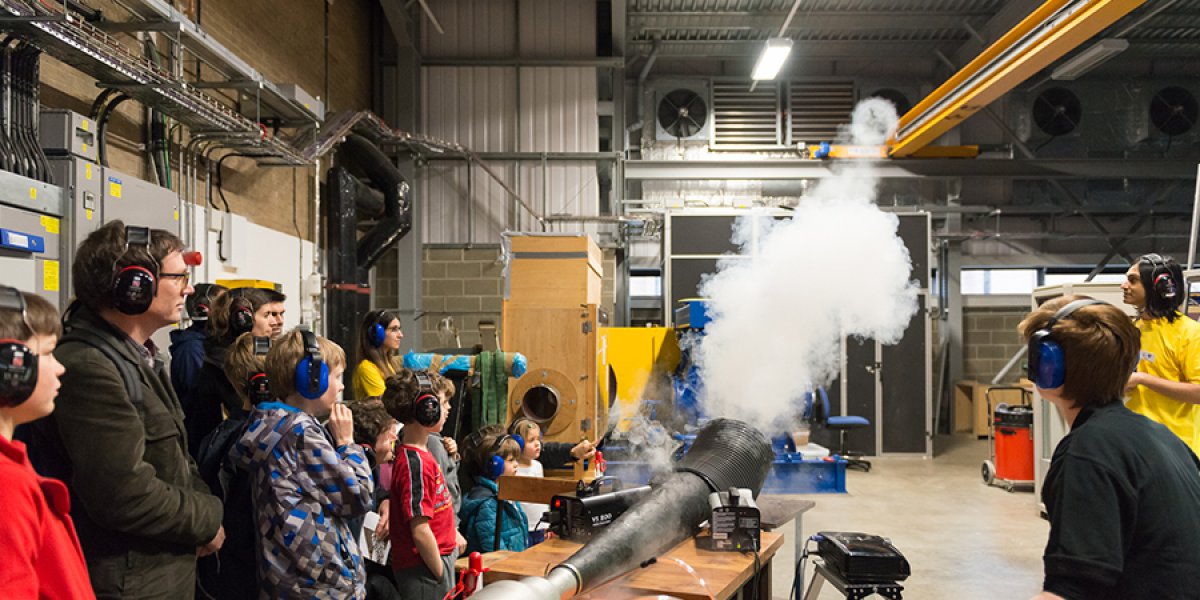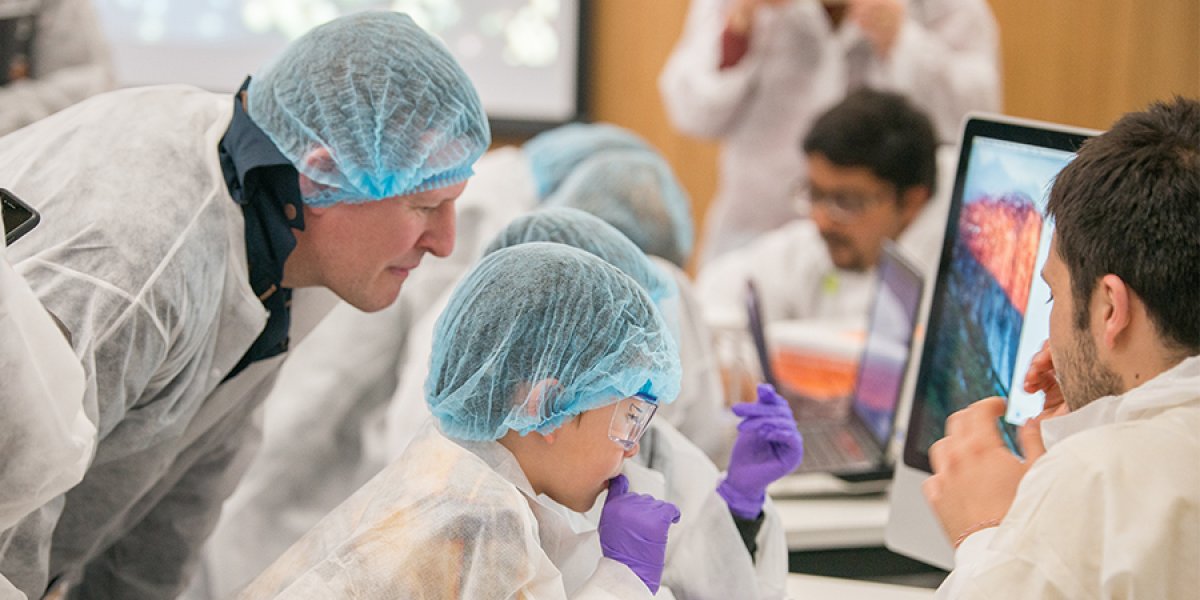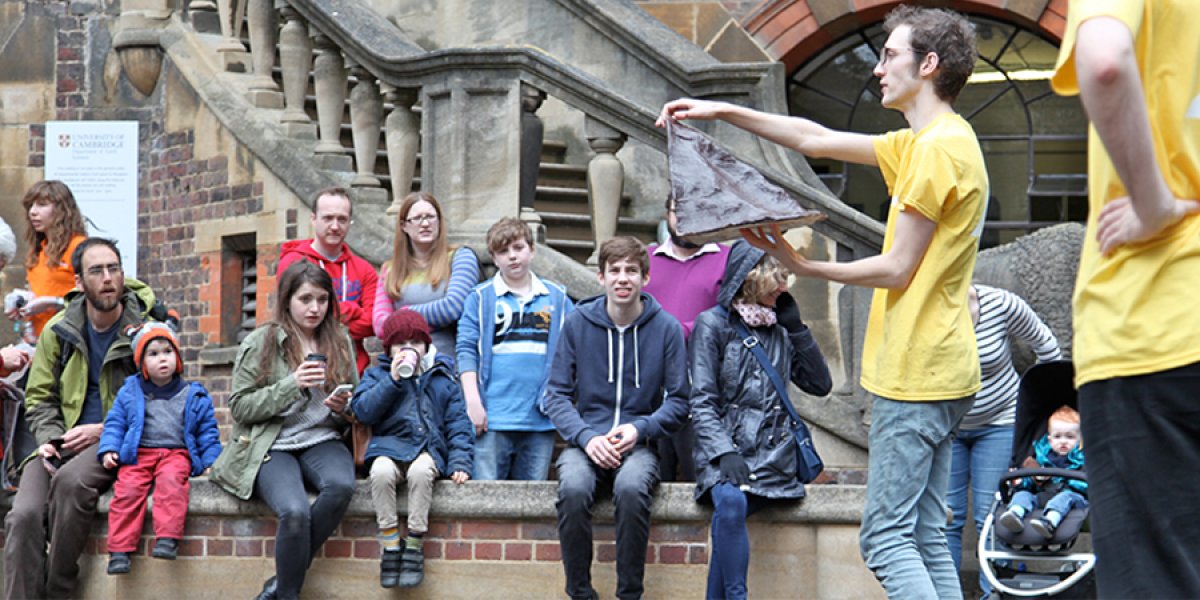Reaching new audiences with new ideas
At Cambridge, vital research is being carried out every single day. Public engagement communicates the impact of this research, while opening up a conversation between the researchers and the public.
We believe it's our duty as a publically funded organisation to talk to people about the incredible research that happens here.
Ariel Retik, Public Engagement and Festival Manager
The upcoming Cambridge Science Festival in March is one of the many events organised by the University Public Engagement team. The Science Festival, the Festival of Ideas and Open Cambridge encourage over 100,000 people to take part in unique events across the University. Outside of the Festivals, additional talks and events take place in all corners of Cambridge, and training is organised for early-career researchers to begin their public engagement career.
Organising such a packed schedule requires the support of a huge network, both within the University and locally. Sarah, Ian, Felicity, Ariel and Lucinda share their experience of public engagement at Cambridge, why it's so important and what the future holds.
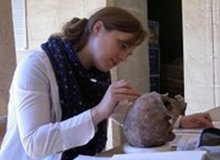
Dr Sarah Inskip, Research Associate in Bioarchaeology
I specialise in bioarchaeology, which is the study of human skeletal remains. My current project, called After the Plague, investigates health and history in medieval Cambridge. Analysing past epidemics can significantly improve our understanding of the present, as well as informing about the future. We’re halfway through the four-year project and are now using the data we’ve gathered to build narratives about people and populations.
The Rising Stars training is run by the Public Engagement team for early-career researchers at the University. There is huge public interest in bioarchaeology and we should be leveraging this to convey messages about health. One of the reasons I applied for the training was to explore ways to achieve that. I’m now applying what I learned to the After the Plague project.
It’s a real privilege to study human skeletal remains and I love what I do. The public empathises and relates to the area, which is harder to do with other types of science. A lot of our research is funded by the public and it’s important to give something back, to show how and where their money is having an impact. After the Plague is special because it’s about Cambridge. We want to create a sense of identity and feeling of belonging in a city that is quite transient. We've had an enormous response to the project and there is definitely scope to do more local community-based projects in the future.
Public engagement is becoming an increasingly important aspect of what we do in showing the relevance and value of our research. It’s rewarding to be out there with the public and see them engaging with what you do, being inquisitive and asking questions.
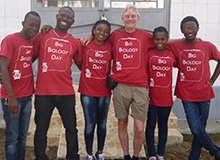
Ian Harvey, biology teacher at Hills Road Sixth Form College
I’ve been teaching A-Level Biology for 43 years and have been involved with public engagement nationally for over 15 years. Public engagement and teaching are similar in their skillset. They both engage, enthuse, educate and help people of all ages to know more and want more.
I went to a brand new grammar school in Worksop. Nobody there had ever been to Oxbridge but my teachers were hugely supportive. I came to King’s in 1969 and studied Natural Science, with a final year studying Zoology followed by research. During my three years in research, I most enjoyed supervising undergraduates and that morphed into my teaching career at Hills Road and for the Open University.
Cambridge has what I believe to be the best biology network anywhere. University departments, research institutes, companies, schools and colleges all work together as colleagues and friends to make things happen. As part of the 2012 Biology Week week, run by the Royal Society of Biology, Amanda Burton and I created Cambridge Biologists to organise the first Big Biology Day (BBD) - a one day science festival that celebrates the life sciences. In the first year we had six exhibitors and about 500 visitors. Six years later, in 2018, we had over 40 exhibitors and 2,000 visitors coming from Cambridgeshire, Suffolk, Essex and beyond. 2019 is the Royal Society of Biology’s 10th anniversary and to celebrate we’re aiming to run 10 Big Biology Days around the country, including a new one in Norwich.
Events in Cambridge get a great turnout but something our network wants to work on is reaching new audiences. A small pop-up hands-on biology event held in a shopping centre in Basildon engaged people who were out for a day’s shopping. We were amazed by the enthusiastic response! Several visitors chose to come to Cambridge BBD a few weeks later. More street science events are on our agenda.
Our Cambridge biology network is passionate about education and engagement. I’m now working in Sierra Leone to promote practical science in schools working with Professor Ian Goodfellow and the Wellcome Trust. My involvement in the Cambridge Science Festival, Bioblitz, BBD, events at nature reserves and primary schools are personally hugely rewarding. Every year brings new opportunities for me and for the network and we love it!
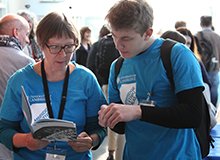
Felicity Macdonald-Smith, volunteer
I have volunteered at the Festival of Ideas and the Science Festival since I retired from my role at Newnham College.
For many people in Cambridge there is still a ‘town and gown’ divide. This isn’t just a lack of awareness of how the University works, what it does and what research is happening, but also a separation of the University from the city. One of the reasons why I volunteer is to try and combat these misapprehensions, as well as to meet new people now I’ve retired and also because I really do enjoy it.
To me public engagement is the way in which the University interacts with the general public of Cambridge, showcasing its research and teaching activities, while inviting audience participation. One of the things I enjoy the most is seeing people coming out of the talks, chatting enthusiastically about what they’ve just heard and seen. At the Science Festival, it’s great to see children getting excited about the hands-on activities and going away with the things they’ve made, explaining the science to their parents.
It’s important for the University to be seen to be looking outwards to the city, and interacting with people who are not involved with the Departments and Colleges. Volunteering at the Festivals is great fun, and I’d encourage anyone interested to join us!
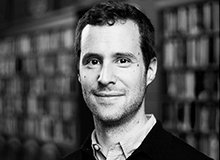
Ariel Retik, Public Engagement and Festival Manager at the University
We believe it's our duty as a publically funded organisation to talk to people about the research that happens here. The research we do here will change the world and looks at the issues most pressing for society, so we have to go out there, we have to talk about it. I feel incredibly lucky to be able to talk to people who are leaders in their field, researching the most fascinating things.
This year we asked participants of the public engagement training course to create an event for the Festivals. The things they came up with were just fantastic. It’s multidisciplinary so we had immunologists with people studying literature and cell biologists with musicians. I expected them to plan a talk but they come up with performances, exhibitions, interactive talks and workshops. I was very proud of that and some of them are now taking part in the Science Festival next month.
When we start planning the Festivals we pick a theme and build a programme from that, tapping into our networks to speak to people about their ideas. We put together panels and speakers to openly discuss topical events from different angles.
Part of the ethos of the Festivals is to provide the opportunity to actually talk to researchers. In a one hour talk we allocate 15 minutes to questions. We want to embed public engagement culture throughout the University. By providing the right support it should be something researchers can do easily and most importantly, enjoy.
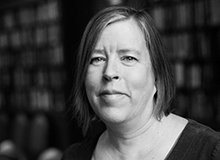
Lucinda Spokes, Public Engagement and Festival Manager
As a former researcher, public engagement is about finding out and sharing new things that are happening in research. Being able to chat to some of the most incredible researchers in this University and then sharing that with thousands of people is just fabulous.
It also allows us to listen to the opinions of the public. They can help influence the research we do so that it becomes mutually beneficial. We provide platforms for researchers to go out and speak to the public by providing advice and training.
Our training supports all stages of research, from first year PhDs all the way up to senior researchers. From that point, we hope that part of their research career will include public engagement. Researchers often tell us that after taking part in a public engagement activity, they're re-energised and excited about their research.
In Cambridge we're lucky enough to have an audience that is keen to find out about cutting-edge research. The Festivals are programmed for the widest possible audience, so as well as big topics in society such as diet and climate change, we also arrange more focused discussions. Controversial discussions demonstrate the debate and process that goes on within research.
